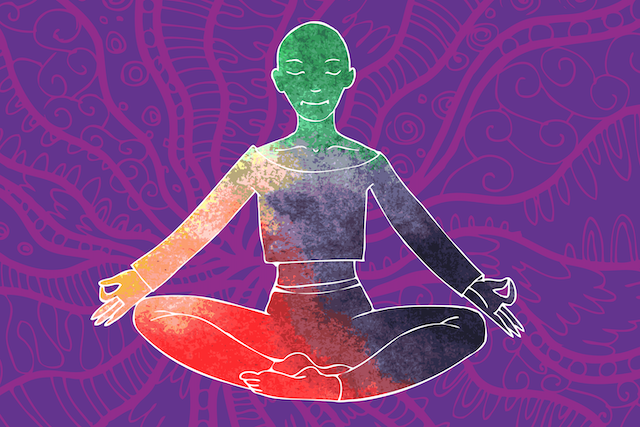
“When you blame others, you give up your power to change.” ~Anthony Robins
I used to be an angry person. And I was happy about that. In fact, I prided myself on that identity during high school.
So devoted to the young and vapid demographic, I would stand in front of the bathroom mirror and practice the eighties version of the mad dog stare. In the eleventh grade, I decided smiling wasn’t hip, so I stopped.
I wore surly like the Goth kids take to all-black attire. My friends thought I was cool because I said what I felt and did what I wanted. “You’re so awesome, Linda—it’s like you don’t care what other people think of you.”
Except that I did. I cared so much, in fact, that I buried the vulnerability and the emotional pain from feeling that I wasn’t in control of my life.
The truth is that many teens don’t feel like they fit in during the tumultuous high school years.
Most people mature and evolve as they get older. Except those who don’t. Those of us who carry the smirk and the swagger past the twelfth grade are in for an adulthood of pain and emotional suffering.
True rebels without a cause.
Luckily, in my twenties I had an epiphany, which led me to change my negative, brooding, fly-off-the-handle ways.
One day during a phone conversation, my friend Rachel made a comment that has stuck with me to this day. I was blabbing on about how the car mechanic was overcharging me for a transmission repair.
All of a sudden Rachel interrupted me and said, “Did you ever notice that you get into a lot of fights with people?”
My stomach dropped and my cheeks were hot as I fought back tears.
I’d like to say I heeded this message immediately. Unfortunately, it was a couple of years before I finally turned my back on angry outbursts.
The irony is that I’ve made a career out of counseling adolescents. Many are referred to therapy because of anger management issues.
“Anger is a completely normal, usually healthy, human emotion. But when it gets out of control and turns destructive, it can lead to problems—problems at work, in your personal relationships, and in the overall quality of your life. And it can make you feel as though you’re at the mercy of an unpredictable and powerful emotion.”
The good news is that, regardless of where your anger originated (DNA, angry parents or family members, childhood experiences, or lifestyle), there are practical tools available to manage your anger so it does not manage you.
I’d be remiss if I said that you’ll wake up tomorrow and feel like Calm Callie or Stress-free Steve.
Because anger has built up over many years, you’re probably good at projecting it (“throwing” it onto others as a defense against feeling it for yourself)—and it will take time to change.
You’ve got to own your anger. Nobody made you into an angry person. Sure Mom and Dad, childhood events, past romantic relationships, and other situations may have contributed, but the past is gone forever.
The beautiful thing is that you have today, and today you can feel calm, collected, and in control of your emotions.
The following five tips, when practiced regularly, will replace negative reactions and lead to a more Zen-like you.
1. Pay attention to your morning routine.
How we start our day affects how the rest of our activities unfold. Set your alarm for fifteen minutes earlier (don’t worry—I’ll make it up on the backend in tip #5).
Before you get out of bed, take a couple of breaths and say something positive. For example, “Another day. Another chance for a fresh start.” When you find yourself rushing throughout the day, remind yourself “there is enough time.”
2. Get in touch with your anger.
Do the following exercise when you have at least thirty minutes of uninterrupted time.
Find a comfortable seated position. Close your eyes and think of what your anger looks like. What color or images do you see? Where in your body do you store anger? Pay attention to body temperature, clinched fists, heart rate, muscle tension, and butterflies in your stomach.
Practice deep breaths throughout this exercise, and take a break if the feelings become too intense.
When you’re ready, open your eyes and take a deep breath. Breathe in through your nose and out through your mouth. Pick up a notepad and jot down all your angry thoughts.
Don’t overthink this—keep the stream of thoughts flowing without editing your responses. Spend at least five minutes recording what, where, when, and around whom you feel most angry.
Read the list and decide what are your three biggest anger triggers and/or situations. Make a circle around the top three.
On another sheet of paper, write three strategies for remedying each one.
For example: Problem #1:
I can’t stand my job.
Strategies:
- Update my resume by Friday at noon.
- Contact two people and network about possible job openings by Thursday at 5:00 pm.
- Call my mentor today and invite her to lunch in exchange for business ideas. (Pick up the tab).
Repeat this exercise frequently, and don’t worry if some of the same issues show up. Problem-solving takes practice and patience.
3. Unplug.
Technology encourages us to react quickly. The minute we get that text or feel the phone vibration, we’re racing to respond. Reacting impulsively is a trigger for angry outbursts. Set aside time each day to be free from checking email, social media sites, and text messaging.
4. Train your mind to respond slower.
Think, speak, drive, text, listen, cook, eat, and walk slower. When you slow down, you’ll feel more in control of your options and your inner life.
Leave post-it reminders on the computer, your car dashboard, and your front door. Our brains are not trained to remember many things, so write it down.
5. Sleep on it!
Honestly, if I had to choose just one option to manage anger, it would be getting sufficient sleep. Sleep deprivation is a huge culprit in negative moods, including anxiety and depression.
Commit to going to bed earlier during the week. It’s nearly impossible to make calm, measured, responsible choices if you can barely keep your eyes open.
Bottom line: You have everything you need to change. With daily commitment, practice, and patience, you’ll increase problem-solving abilities so you can manage your anger, rather than have your anger manage you.
Remember, living in the past causes depression. Living in the future causes anxiety. Living in the here-and-now enables you to make healthy choices to increase emotional well-being.
And the future begins now.
About Linda Esposito
Linda Esposito, LCSW is a psychotherapist in Los Angeles, CA. Her views on mental health can be found online at the Huffington Post and Psychology Today. Her latest project, Wired For Happy helps intrepid mental wellness strivers achieve more positive emotions and healthier relationships. For information about Team Happy, click here.













 Though I run this site, it is not mine. It's ours. It's not about me. It's about us. Your stories and your wisdom are just as meaningful as mine.
Though I run this site, it is not mine. It's ours. It's not about me. It's about us. Your stories and your wisdom are just as meaningful as mine.
I’ve recently been learning how important it is to slow the frack down. I get jacked up sometimes and rush around doing stuff, and it only makes me anxious and stuff. Slow down! Get up earlier, get enough sleep, breath, and against all popular wisdom, put some stuff off until tomorrow!
Hi TB!
Glad to hear that you’re heeding the message to slow down. One thing I’ve found super helpful regarding prioritizing is to make a list each day of just two things that need to get done. This way, I’m assured that my “Two To-do” is visible, and I’ve accomplished the essentials. All else can wait–we have a way of making time for that which is important to us.
And adequate rest–I cannot say enough about how vital this is to our health and emotional well-being.
Take care,
~Linda
Thank you for this. This article was like reading a part of my own past. I will definitely try your suggestions.
Hi Amanda! I’m glad that my past experiences resonated with you. Sometimes we have to go back in time, in order to go forward with positive change.
Thank you for sharing your feedback 🙂
Thank you so much for this. It seems like the Universe led me here just for this time. I’ve been trying to figure out if the anger I’ve been feeling is justified. Whether it is or not, it’s mine and is only using up my energy…energy better used in learning to slow down, breathe and think. It’s what I tell my grandchildren so it’s time to practice what I preach.
Thanks. Very good and timely.
Hi Barbara! So glad the Universe sent you to this lovely, Zen place that Lori and others have so peacefully cultivated.
Give yourself time to let the anger digest and flow through you. Anger is extremely powerful and can be overwhelming…
Amazing how we’re often able to help others see the destructive patterns of anger, before it sinks in for us.
Take it slow—you got this!
this couldnt have come at a better time. I fell like my anger has been controlling me lately so I have been wanting to take steps to change that. Thanks so much for your article!
So happy you found this useful, Karisa!
Good luck with steps to control your anger–take it one step at a time and do what works for you. There’s no one-size-fits-all and you’re the expert on your life 🙂
You’re welcome, David!
Love this. Thanks Linda. <3 <3 <3
When the pupil is more than ready … a teacher appears (or similar) ….I have been feeling ashamed of my behaviour and attitudes in my early years, say pre 40’s. I wrote letters telling others how their behaviour affected me and they were very pointed and nasty sometimes.
In my heart I have apologised though I am now afflicted with social anxiety is this related?
Hmm…Susee, I think whenever we feel shame, we’re primed for overly negative feelings of self-loathing. Often our memories are skewed, and we may ascribe more blame to ourselves than is necessary.
Social anxiety is tied to shame, and fears of losing control and being publicly humiliated. If others have contributed to these uncomfortable feelings, it’s possible that social anxiety would result.
It’s a good idea to write letters to others. You can only control what you communicate, not how others respond. Sometimes the best thing to do when you don’t find the closure you were looking for is to let go…
Thanks Elise!!
Hi Linda – A wonderful post about anger, stress, identity changes. I enjoy your writings!
Great post, Linda. A few years ago, a friend of mine told me that he’d chosen to use the phrase “I have anger,” instead of “I am angry.” It was a helpful reminder that he was not defined by his anger and could let it go.
I also love your reminder to slow down. That’s advice that needs to be heeded in this “always-connected” age–even for those of us who aren’t working through anger.
Thanks for the kind words, Janelle 🙂 “I have anger” is a great phrase for reframing the emotion and externalizing the source. It reminds me of our tendency to say to kids, “you were bad” or “you were good,” rather than focus on the behavior which was, or was not appropriate. Glad the reminder to slow down is helpful.
Why, thank you Kathy. I’m glad you could join me in this beautiful space online :).
You deserve the very best of everything, and I wish that for you, wholeheartedly.
Hotel Lubeck
It was a helpful reminder that he was not defined by his anger and could let it go.
films
I believe that we can save lives and change the world and it starts with the youth. Ian Filippini Montecito
Nothing you recommend worked for me. I was a dangerously angry man into my early fifties. I knew I had a serious problem but had never found a solution. I was addicted to my anger and actually found it useful but it was also destructive of my core relationships.
I will make this story short and leave out the details.
Finally I found a solution. I knew a man who was a martial artist, Kung Fu. Steve was an expert trained for years in China as young man and adept at the art. I told him I had an anger problem. I told him I wanted to come in once a week and fight with him. I am not athletic and am no threat to a man like Steve so he said sure. I paid him a nominal fee (far less than a shrink would ask) and went to see him once a week. We would do a few Kung Fu katas for about 30 minutes. Then we would spar. I would try to kill him. That was a joke, of course, but I could put all of my anger into it. I think I may have bushed his chin once. He would occasionally knock me across the room and could do so any time he chose to. Mostly he just waltzed around and laughed at me.
I had immediate palliative relief. I could get through a week of normal social interaction without blowing my stack. Then though something deeper took hold. My anger just began to go away. Steve taught me to breath. Before as I become angry I unconsciously held my breath causing my limbic system to go into an uncontrollable “fight or flight” response.
One day after three years of working with Steve I went in and said, “I am not angry. I do not need to do this any more.” I have been free from anger now for over 20 years.
If you have truly serious problem with anger I highly recommend you try this approach. Linda’s suggestions may work for people with a mild anger problem but if your problem is serious you need a harder and deeper therapy which a good marital artist like my dear friend Steve can provide.
I get TRIGGERED, at one particular person; a lady who is paid to do housekeeping, laundry, and grocery shopping for me.( i am almost 70, and have some disability)This lady is honest,does not steal,and generally cares about people.–but when i can’t find something i need,I instantly call her up,and last time got very angry at her,asking”where is it?did you throw it out?”(I had several helpers before who stole.)I I can’t trust anyone i have to depend on,and all my angwr gets triggered, if i can’t find something. I NEED ANGER MANAGEMENT, and I just cannot afford a real psych. professional,and my insurance is worthless.I CANNOT GET TRIGGERED BY ANGER, any more, the helpers dump people who do that,all of them.–this one may leave.I HAVE TO STOP THIS NOW–deflect it,to someone,something, hide the dumb phone, call suicide hotline,–or I will lose my helper. I have been angry all my life, nothing helps.If I had been a guy,with testosterone, I would be in prison serving life sentences, guys often do this,with anger.–I’m just old,with too much anger—- my dad was angry all the time.HOW DO I DEFLECT IT?I don’t think martial arts will work for me.(HOW ABOUT WHACKING WEEDS,and brush,vines,and hacking up uncut yards I have?) thanks!
Hi, would you recommend something very physical for me?unfortunately, i have fibromyallgia & a lot of inflammation.but you were right, my system demands an out let.I swear a lot.when I’m trying to find something—women aren’t supposed to SWEAR like sailors, but I like it.–it helps.Maybe just SWEARING LIKE CRAZY at a “swearing opponent” on a chat room? yeah, I think martial arts are great,I love good kung fu movies.—I was very active into my 50’s till a disability stopped me–it drives me nuts! I can’t do regular yoga now.thanks, BobLQ. Looks like we “klingons” will be very angry,or violent,and very physical stuff works for us. 🙂
YES, THANK YOU, for the advice about slowing down;I get too many things to do,and get stressed out—stress is a big problem for me.I get very busy., Then I can’t keep from being angry, while its the hardest thing to handle.I think pointing it all at a martial arts guy might wreck my back,now,though it sounds like fun. 🙂
Wow! I really identified with what your friend said. I do tend to ‘get into a lot of fights with people’ or ‘give them a piece of my mind’. Your article has some really useful tips and I plan to incorporate some of them into my daily practice. Thank you.
This is an very old post but I find it very helpful. Everything I am reading is not working. Only thing which makes difference is punching and kicking. Sometimes it helps to yell during the session. All the methods described above are not letting the anger out. I have serious issue that my anger build-u is so high lately that every single drop throws me in full blown anger outburts followed by meltdown. Getting up 15 minutes earlier is going to kill me.